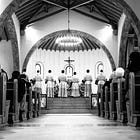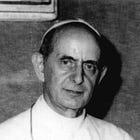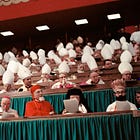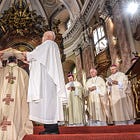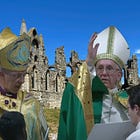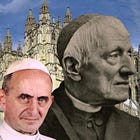Archbishop Lefebvre & Conditional Confirmations—His pastoral practice explained
Why did Archbishop Marcel Lefebvre repeat the sacrament of confirmation 'conditionally' for anyone previously confirmed in the new rite?
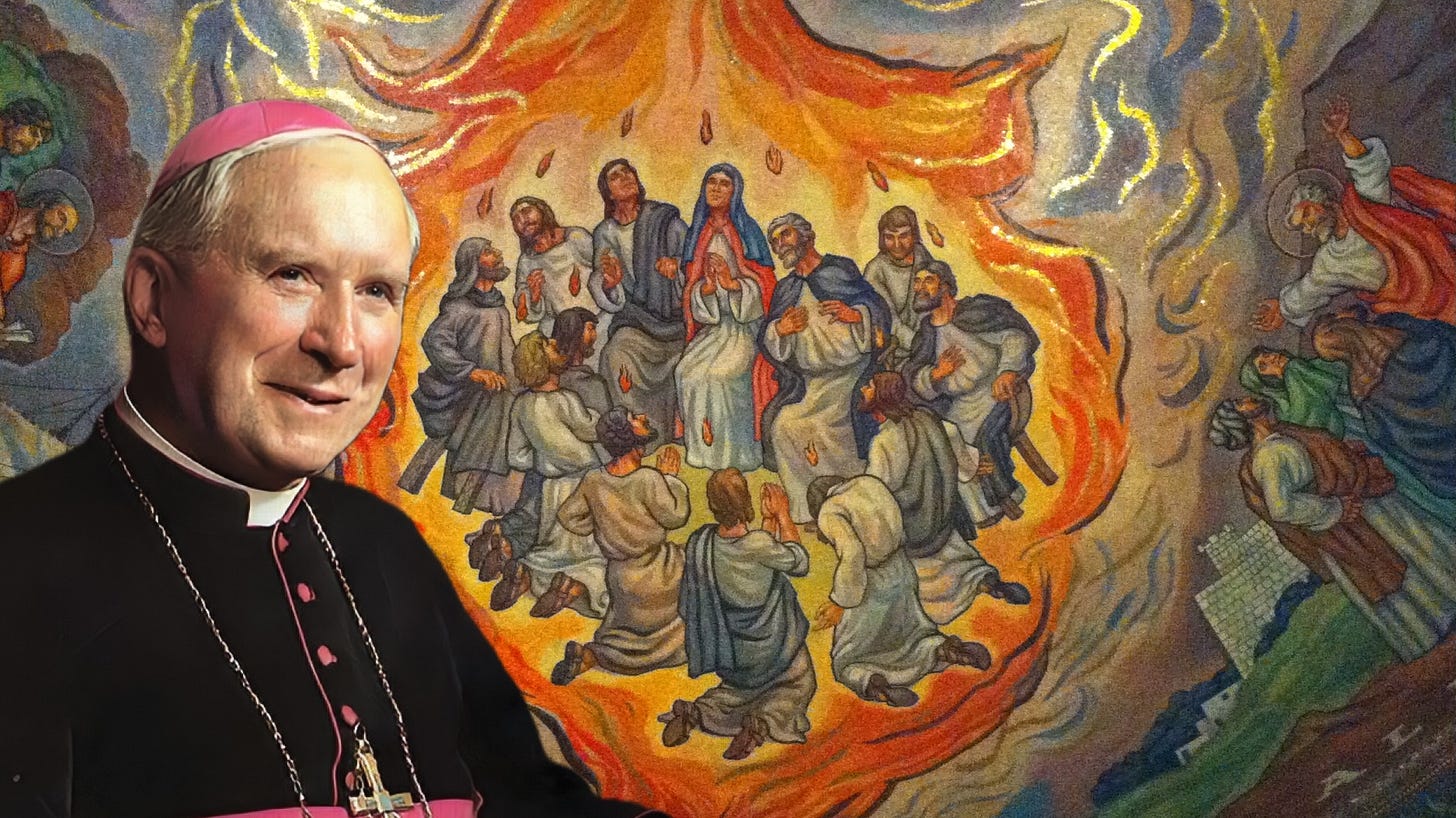
Why did Archbishop Marcel Lefebvre repeat the sacrament of confirmation 'conditionally' for anyone previously confirmed in the new rite?
Introduction - what is ‘conditional repetition’ of a sacrament?
This is the first part of a series proposing arguments, based on Archbishop Marcel Lefebvre’s words, actions and principles, as to why it is necessary for certain sacraments conferred in the Novus Ordo rites to be repeated “conditionally.” This particularly applies to the holy orders.
Canon 732 (1917) states:
§ 1. The Sacraments of baptism, confirmation, and orders, which imprint a character, cannot be repeated.
§ 2. But if a prudent doubt exists about whether really and validly these [Sacraments] were conferred, they are to be conferred again under condition.
Why focus on Archbishop Lefebvre? Archbishop Lefebvre was an enormously significant figure in the twentieth century, and he remains enormously significant to the greater number of traditionalists today.
Hence, while Lefebvre is not a proper authority whose opinions can definitively settle such disputed questions, he nonetheless enjoys some sort of “auctoritas,” such that what he thought about the crisis in the Church is interesting and important in its own right, with practical ramifications for many people.
As an example of such ramifications, the bishops whom Lefebvre consecrated in 1988 frequently confirm those who are not their subjects, and conditionally confirm those who had previously been confirmed in the Novus Ordo rite.
Very many traditional Catholics still receive conditional confirmations from the bishops of the SSPX, whilst many others are puzzled at the rationale for such a practice. Lefebvre’s practice is also followed by the all other traditionalists bishops, despite their varying schools of thought on other matters.
As such, understanding Lefebvre’s pastoral approach to confirmation is important in itself, even prescinding from it being the basis for conditional ordination/consecration.
Overview of the arguments in this series
Regarding the theme of conditional ordination/consecration, here are the three main arguments, based on Lefebvre’s words, actions and principles, which we shall consider in this series:
The practical argument
Lefebvre stated that the widespread problem of careless administration and possibly defective sacramental intention rendered sacraments conferred in the Novus Ordo milieu of prima facie doubtful validity, if not certainly invalid.
Investigations into whether a given man was ordained/consecrated “correctly” (according to the reformed rites). This would require not just an investigation into the validity of his own ordination/consecration, but also the ordination/consecration of his ordaining/consecrating bishops, as well as these bishop’s ordination/consecration, and so on back to the 1960s (as well as the baptisms of many involved, due to documented problems there too).
The first argument holds that this is excessively burdensome, morally impossible, and cannot hope to secure widespread confidence. As a result, moral certainty for some sacraments, including holy orders, can only be attained with a certainly valid conditional repetition.
Archbishop Lefebvre recognised this with growing clarity, saying in 1988:
“I agree with your desire to reordain conditionnaly these priests, and I have done this reordination many times. All sacraments from the modernists bishops or priests are doubtfull now. The changes are increasing and their intentions are no more catholics.”1 (Grammar as written by Lefebvre)
This argument is discussed, along with many examples of Lefebvre expressing his doubts, in Part III:
The theological argument
The second argument is that the combination of Lefebvre's correct factual analysis of the Vatican II revolution and its reformed rites on the one hand, and true theological principles (also expressed by Lefebvre) on the other hand, points inexorably to conclusion that the reformed rites do not come to us from the Church, and do not enjoy her approval or sanction.
The circumstances mean that this in turn points to universal and unresolvable doubt about certain sacraments, which is intrinsic to those rites which have been changed in their essentials.
This calls for a universal practice of conditional ordination for all whose orders depend on the reformed rites.
This argument is discussed, at length below:
It is discussed with particular reference to Archbishop Lefebvre in Part II of this series:
The pastoral argument
The third argument – which which we begin this series – is that Lefebvre repeatedly emphasises the rights of the faithful, not only to receive valid sacraments, but to be certain that they were receiving valid sacraments.
This led him to act in a controversial way, namely by a) confirming those who were not his subjects, and b) conditionally confirming those who had previously been confirmed in the reformed rites.
Even if the above arguments are deemed to be inconclusive in themselves, many laymen and not a few priests find them compelling enough to be uneasy about the validity of Novus Ordo ordinations/consecrations. This uneasiness cannot be dispelled by investigations, which we have already seen are a) morally impossible, and b) begging the question against the theological argument.
As a result, peace and the common good can only be attained with the certainly valid conditional ordination for all whose orders depend on these rites; and this is justified, based on Lefebvre’s pastoral principles and sound moral theology.
This is the argument which we shall consider in this piece, by considering Archbishop Marcel Lefebvre’s attitudes towards these reformed sacramental rites, with a particular focus on those of holy orders.
Why start with confirmation?
We have already mentioned how widespread the practice of conditional confirmation is amongst traditional Catholics. It provides a number of instructive parallels for considering the validity of the new rite of ordination.
However, the main reason is chronology. The Archbishop's confirmation tours – in which he conferred the sacrament in the traditional rite on those who were not his subjects, including conditionally on those who had been confirmed in the reformed rite – was one of the early post-conciliar battlegrounds.
It also demonstrates that the bar for establishing “prudent doubt,” and therefore grounds for conditional repetition, is lower than many might think.
Through considering his attitudes and actions with regards to the reformed rites of confirmation and holy orders, we will also see that:
1. Archbishop Lefebvre considered it an accepted and acceptable opinion to have a universal presumption of doubt about the validity of holy orders conferred using the reformed rites.
2. Similarly, he considered it to be an accepted and acceptable opinion to reject and avoid everything to do with the conciliar reforms – indeed, at times he clearly stated that this was obligatory for those who wished to remain Catholic.
We will also see that his willingness to repeat sacraments conditionally was animated by a sensitive and pastoral concern for the faithful who had attached themselves to him, and motivated by both charity and justice.
This was an advanced preview post for members who choose to support us with a monthly or annual subscription.
Work like this takes a lot of time and energy. Please consider subscribing if you like it.
We make members-only material freely available to clergy, priests and seminarians upon request. Please subscribe and reply to the email if this applies to you.
Early Comments on Confirmation
In 1974, Archbishop Lefebvre said specifically of confirmation:
“It can happen that the sacraments are not valid. In any case it can occur that the Sacraments are doubtfully valid, that is, that they are doubtful.”2
In 1975, he again discussed the subject of his unusual administration of confirmation. This text is notable for his pastoral concern and willingness to give the faithful peace of mind regarding the validity of the sacraments conferred on their children (and, by extension, themselves).
His comments about the “certainly valid” traditional rite also suggests, by implication, some level of concern about the reformed rite itself:
“I believe that we all have a serious requirement for the type of priests who transmit the life of the soul. I am certain you do not wish to have priests who are apt to administer sacraments, which are invalid.
“From time to time I am asked to administer Confirmation which, of course, is irritating to local bishops who remind me that I have no right to confirm in their dioceses.
“Naturally, I recognize this, but I remind them in turn that they have no right to administer sacraments of doubtful validity to children whose parents want them to receive the sacramental grace. These parents have the right to be certain that their children are receiving the grace of Confirmation. This is, after all, a grave responsibility for parents. It is grace, which keeps the soul alive, and, to this end, I much prefer to see parents confident that their children have received the sacramental grace of Confirmation even when, by administering the sacrament in someone else's diocese, I am acting illicitly.
“I may at least rest easy in the knowledge that the children confirmed in the manner prescribed by the Church for centuries truly carry the sacramental grace within them, that the sacrament is truly valid.
“With respect to sacraments of doubtful validity, today bishops rarely confirm: they delegate their vicars-general or other priests, and many of these change even the new authorized formulas. Because the particular sacramental grace of each sacrament has to be signified explicitly, and as many of these changes of working do not signify the sacrament in question, it follows that the sacrament is invalid. In other words, it is not permissible to toy with the formula of the sacraments, just as in the Sacrifice of the Mass we many not tamper with the wording of the consecration. It is necessary to perform as the Church has always intended.”3 (Line breaks added)
Here we can see Archbishop Lefebvre treating the conditional repetition of the sacraments as both a pastoral necessity, and as a matter of justice to the parents and children.
In his 1985 book Open Letter to Confused Catholics, the Archbishop expands on this point:
“I always respond to the requests of parents who have doubts regarding the validity of the confirmation received by their children or who fear it will be administered invalidly, seeing what goes on around them. [...]
“I explained why I carried on in this way. I meet the wishes of the faithful who ask me for valid confirmation, even if it is not licit, because we are in a period when divine law, natural and supernatural, has precedence over positive ecclesiastical law when the latter opposes the former instead of being a channel to transmit it.
“We are passing through an extraordinary crisis and there need be no surprise if I sometimes adopt an attitude that is out of the ordinary.”4 (Line breaks and emphasis added)
What did he think of the new matter and form for confirmation?
Lefebvre’s stated grounds for doubt pertained to the matter (the oils used and the manner of administration), the form (the words), the sacramental intention of the minister, and – as we shall see in due course – the actual validity of the minister's orders themselves.5
When publicly justifying his actions in absolutely and conditionally confirming those who were not his subjects, he often focused on the faithful's desire for the traditional rite, as well as problems with careless administration, sacramental intention, and the permission for ministers to use non-olive oil.
We have already seen Lefebvre’s concerns about the use of non-olive oil. These concerns, which are much more significant than many realise, are addressed in the next part. In short, Lefebvre accepted that the reformed rite could be valid, provided certain officially-permitted options were not used. But concerns about an officially-permitted option for sacramental matter are just as intrinsic to the rite as concerns about an officially-mandated change in matter (or form). Hence, it is not accurate to say that Lefebvre accepted the validity of the rite.
It is not immediately clear what the Archbishop thought of the reformed form of confirmation. It seems reasonable to think that he was perplexed.
At times he stated that he believed that it was valid. In 1983, he suggested in a conference at Ridgefield that, rather than assuaging generalised doubts about the new rite, he was responding to those with particular reasons for doubt about their own sacrament:
“I hope that you know if your Confirmation was valid or very doubtful. If there is no doubt, then you cannot ask me to repeat it. You know, that is very important. In Rome, they accuse me of performing many conditional sacraments without having investigated to see if there was sufficient doubt to warrant repeating them.”6
In 1979, during his examination by the CDF, he was also asked directly which sacramental formula he used for conferring Confirmation, and whether he recognised the validity of the reformed rite. He answered:
“I used the old sacramental formula. But I recognize the validity of the new Latin formula. I use the old formula to meet the wishes of the faithful. […]”7
While it might be tempting to take these to be definitive statements (especially if one personally favours this position), the reality appears to be that Lefebvre was undecided on the issue.
This is hardly surprising, given the implications of the different possibilities. It is most unfortunate that the Archbishop – it would be unfortunate for anyone – was nonetheless forced to take public stances on these tremendously difficult questions.
However, in spite of his claim to recognise the new formula in the examination by the CDF, in the same 1979 answer the Archbishop seems to let slip that other concerns were also present to his mind.
"Salus animarum suprema lex – the salvation of souls is the supreme law. I cannot refuse the sacrament to the faithful who ask me for it. It is at the request of the faithful, attached to Tradition, that I use the old sacramental formula, and also for safety's sake, keeping to formulas which have communicated grace for centuries with certainty.”8 (Emphasis added)
In his biography of the Archbishop, Bishop Bernard Tissier de Mallerais also suggests that he was uncertain about the form:
“The Archbishop also believed that the validity of the sacrament of confirmation was affected by the new ‘form’ of the sacrament published on August 15, 1971.
“It came from an Eastern confirmation rite and expressed less clearly the special character of confirmation, especially in the sometimes unreliable vernacular translations.”9
Bishop Tissier de Mallerais's phrasing is important: it is true that the new form "came from an Eastern confirmation rite"; but in fact, it is not identical with any Eastern form, and Rama Coomaraswamy has argued that there is some significance to this difference.10
Is this difference significant enough to cast doubt? Some are personally sure of validity, based on their own reasoning, rather than the “authority” of the Conciliar Church's promulgation of the rite. But once they have begun trying to prove that the reformed rites fulfil the requirements of Catholic sacramental theology on intrinsic grounds, they are already implicitly conceding that "the authority of the Church" is insufficient to guarantee these rites.
Are they entitled to act on what is therefore necessarily only a probable opinion, based as it is on their own reasoning? And are they entitled to impose their personal certainty on others, and treat their personal reasoning as decisive?
It would seem strange to answer these questions in the positive, both because of general theological principles, but also because this particular change is a part of a wider reform that the Archbishop tells us that we are obliged to reject:
“It is impossible to modify profoundly the lex orandi without modifying the lex credendi. To the Novus Ordo Missae correspond a new catechism, a new priesthood, new seminaries, a charismatic Pentecostal Church—all things opposed to orthodoxy and the perennial teaching of the Church.
“This Reformation, born of Liberalism and Modernism, is poisoned through and through; it derives from heresy and ends in heresy, even if all its acts are not formally heretical.
“It is therefore impossible for any conscientious and faithful Catholic to espouse this Reformation or to submit to it in any way whatsoever.”11
Further, given that this form is indeed not identical to a rite received and used by the Church, it seems clear that Catholics are entitled to seek certainty and peace through conditional repetition of the sacrament.
We can see a further example of this attitude in a conference given in 1975, which uses similar language to other conferences and was included in a different translation in the anthology A Bishop Speaks:
“A common rite today is to pronounce simply ‘I sign you with the Sign of the Cross. Receive the Holy Spirit.’ In administering Confirmation, the bishop must indicate precisely the special sacramental grace whereby he confers the Holy Ghost. There is no Confirmation if he does not say, ‘I confirm you in the name of the Father...’
“Bishops frequently reproach me, and remind me, that I confer the Sacrament where I am not authorized. To them I answer that I confirm because the faithful fear that their children have not received the grace of Confirmation, because they have a serious doubt as to the validity of the Sacrament conferred in their Churches. Therefore, in order that they might at least be secure in their knowledge of the validity of the sacramental grace, they ask that I confirm their children.
“And I respond to their plea because it appears to me that I may not refuse those who request that their confirmation be valid, even if it may not be licit. We are clearly at a time when divine natural and supernatural law takes precedence over positive Church law when the latter is opposed to the former, when in reality it should he the channel leading to it.
“We are living in an age of extraordinary crisis, and we cannot accept its Reforms. […]
“I count on you for your prayers for my seminarians, that they may become true priests, priests who have the faith, in order that they may administer the true Sacraments and celebrate the true Holy Sacrifice of the Mass.”12 (Line breaks and emphasis added)
Despite the similarity between this text and others given, it is marked by a significant distinction: this text is not just objecting to distortions of the reformed rite, or to the use of non-olive oil, but rather contains (at least by implication) a critique of the reformed form itself.
It also contains yet another statement of the Archbishop's “pastoral” reasons for conditional confirmations, along with a reminder of the necessity of rejecting the conciliar reforms as a whole.
What do his other actions tell us?
In the 1983 text above, the Archbishop suggests that the faithful should have some positive, specific reason for doubt about the actual administration of the rite, or the actual minister of the sacrament. As already seen, Canon 732 §2 requires conditional repetition “if a prudent doubt exists” about validity.
In another piece, we also saw that the moralists McHugh and Callan taught that the conditional repetition of a “useful sacrament” (such as confirmation – as opposed to a “necessary” or “more important sacrament” such as baptism or orders) may be:
Forbidden, if repeated on basis of a “groundless and foolish” fear
Lawful, if repeated on the basis of a “prudent misgiving”
Obligatory (gravely or lightly, depending on the case) if repeated on the basis of a “well-founded fear” and “if charity, justice or religion calls for repetition and the inconvenience will not be too great.”
From the text above, two questions may arise:
Is a doubt about confirmation (and, to be discussed at a later date, some of the other reformed sacramental rites) “groundless and foolish,” or a “prudent [and] well-founded fear,” or somewhere in between (e.g., a “prudent misgiving”)?
What did Archbishop Lefebvre think and how did he act?
It is a fact that, in practice, the investigations mentioned, into the validity of confirmation, have not been a real requirement. They have not typically played a part in the conferral of conditional confirmation; nor have the faithful been consistently warned about such a requirement. Exceptions have occurred here and there in the life of the Society, but they do not seem to have been enforced in any serious or widespread way.
Critics of the Society could paint this as being careless with sacred things. A more sympathetic interpretation of this is that “actions speak louder than words”. This practice (and omission) shows that a confirmation conferred in the reformed rite – without any particular investigation – is itself taken as basically sufficient grounds for some sort of prudent, positive doubt or misgiving, and thus for conditional confirmation.
Fr Peter Scott SSPX is a witness to this attitude, in a “Q&A” on the topic:
“The bishops of the Society administer the sacrament of Confirmation conditionally when the faithful request it, that is, when they have a reasonable doubt as to the validity of the sacrament that they received, and this doubt cannot be resolved, as is usually the case.”13
Again, there is no suggestion in Fr Scott’s answer of any serious need for an investigation into each case, or that each individual has such a duty. Rather, there is the presumption that these things are generally too difficult to resolve, and that a generalised state of doubt is reasonable.
He then gives the examples of wrong types of oil, and doubts about the words used. And yet he concludes:
“Since there is a great variety in the words used, and since the traditional words ‘I sign thee with the sign of the cross and I confirm thee with the chrism of salvation, in the name of the Father and of the Son and of the Holy Ghost’ are never used, there is very frequently a doubt about the validity of the administration of this sacrament.
“This is the reason why the Society’s bishops do not hesitate to administer it conditionally when asked to do so.”14
It is clear from this phrasing that the failure to use the traditional words is treated, even if just implicitly, as sufficient grounds for doubt. In any case, the results of such an investigation can no more be imposed on others than can the private reasonings as to the validity of the rites themselves.
This idea is expressed in even clearer terms by Fr Matthias Gaudron SSPX in his Catechism on the Crisis in the Church:
“Because of the defects presented above, one should not receive the sacraments in the new rites, but only in the traditional rites, which alone are worthy and certainly valid.
“Receiving the sacraments under a form that is even slightly doubtful is not allowed.”15 (Emphasis added)
As an aside, McHugh and Callan's distinctions show that dismissing a generalised doubt about confirmations administered in the new rite as “groundless or foolish” (or scrupulous) necessarily entails accusing the Society of permitting and promoting unlawful and even sacrilegious repetition of the sacraments.
The circumstances mean that avoiding making this (obviously false) accusation entails admitting that we do indeed have grounds for at least a “prudent misgiving” (if not more) about either the reformed rite of confirmation itself, or at least the moral universality of its administrations in practice – the unresolvability of which leads to the same practical conclusions.
Conclusion
Archbishop Lefebvre seems to have been understandably uncertain about these issues – including the very fact of whether he should or could be uncertain. At the very least, it is clear that he was uneasy about the reformed rite, and did not seem sure of what to make of it.
Who but the most callow today could fault him for uncertainty here; and who did more to respond to it at the time than he did?
In the early stage of the post-conciliar crisis, even if he did not voice his thoughts explicitly, the Archbishop’s words and deeds seem to express more or less doubt about the reformed rite of confirmation in principle, as well as accepting a presumption of doubt regarding of any given confirmation in this rite.
He did, however, explicitly recognise the legitimacy (and later, the necessity) of adhering to the traditional rites to the exclusion of the new.
He also explicitly recognised the pastoral and psychological needs of the faithful for certainty with regards to sacramental validity. Here, we see him acknowledging that “justice, charity or religion” (as McHugh and Callan say) obliging him to repeat these sacraments conditionally.
In other words, there is no need to think that the minister (still less his superiors) must themselves be certain that a given sacrament is doubtful, nor that they must personally find the grounds for concern compelling (or more compelling than the contrary), in order to recognise such doubt as legitimate and to remedy the situation accordingly.
Later in his “retirement”, we can see the Archbishop’s opinions getting firmer, both for this sacrament and for others. He remained somewhat uneasy and uncertain, and appeared reluctant to draw definitive conclusions on complicated issues outside of his authority.
But his general attitude can be summarised in his words and those reported by Bishop Tissier de Mallerais in the section on confirmations. He said:
“We no longer know if they are sacraments which give grace or do not give it.”16
And Bishop Tissier de Mallerais’ summarised:
“The faithful have the right to receive the sacraments validly.”17
All in all, the portrait that emerges is of a sensitive and pastoral Shepherd, trying to make sense of an unprecedented situation, whilst holding fast to what were his clear duties. It is a portrait of a bishop so concerned with the salvation of souls that he would travel the world in order to give the faithful certainly valid confirmations in the traditional rite, along with subjective peace and certainty on the matter – even if this involved acting somewhat outside of the normal way of doing things, and even if he was not himself always sure about how to judge the gravity of these doubts.
In the next parts, we will see that there are powerful arguments, based on what we have learned from Lefebvre himself, to doubt that a given priest or bishop, ordained or consecrated in the reformed rites, has validly received the sacrament of holy orders. There are also powerful reasons to think that these doubts cannot be resolved by studies or investigations.
Even if one does not find these arguments and reasons conclusive, many others do; and still more find them convincing enough to be unsettled by the prospect of receiving the sacraments from “Novus Ordo priests” and “Novus Ordo bishops.”
As a result, it is clear how Lefebvre’s pastoral practice could be applied here:
Peace and the common good can only be attained by men previously ordained/consecrated in the reformed rites receiving conditional ordination/consecration, from a minister whose orders do not depend on these contested rites.
It does not seem necessary for the minister or the men to be conditionally ordained/consecrated to be personally convinced by the necessity of such a step. One can recognise the worth of arguments, of an objective state of doubt, or of the necessities of peace and the common good, without personally embracing the doubt or conclusion of invalidity oneself.
In the next part, we consider “the theological argument” for such conditional repetition:
HELP KEEP THE WM REVIEW ONLINE!
As we expand The WM Review we would like to keep providing free articles for everyone.
Our work takes a lot of time and effort to produce. If you have benefitted from it please do consider supporting us financially.
A subscription from you helps ensure that we can keep writing and sharing free material for all. Plus, you will get access to our exclusive members-only material.
(We make our members-only material freely available clergy, priests and seminarians upon request. Please subscribe and reply to the email if this applies to you.)
Subscribe now to make sure you always receive our material. Thank you!
Follow on Twitter, YouTube and Telegram:
Read Next:
Letter dated 28 October 1988. The handwritten letter and transcription have been made available by the Dominicans of Avrillé here.
Lefebvre, ‘To Preserve the Faith’, sermon given Pentecost Sunday, 1974. http://sspxasia.com/Documents/Archbishop-Lefebvre/To-Preserve-the-Faith.htm
Lefebvre, ‘The Holy Sacrifice of the Mass’, An Address Given by His Grace: Ottawa, Canada November 1975. http://www.sspxasia.com/Documents/Archbishop-Lefebvre/The-Holy-Sacrifice-of-the-Mass.htm
Lefebvre, An Open Letter to Confused Catholics, Fowler Wright Books Ltd for The Society of St Pius X, Leominster, Hertfordshire, 1986. Pp 54-5
This is a subject for a later part. In the meantime, let’s see the famous quote from his Open Letter to Confused Catholics:
“All these Popes have resisted the union of the Church with the Revolution; it is an adulterous union and from such a union only bastards can come. The rite of the new mass is a bastard rite, the sacraments are bastard sacraments. We no longer know if they are sacraments which give grace or do not give it.
“The priests coming out of the seminaries are bastard priests, who do not know what they are. They are unaware that they are made to go up to the altar, to offer the sacrifice of Our Lord Jesus Christ and to give Jesus Christ to souls.”
Chapter 15, https://www.sspxasia.com/Documents/Archbishop-Lefebvre/OpenLetterToConfusedCatholics/Chapter-15.htm
This text is from a photograph of a typewritten 1983 conference at Ridgefield, Conncticut entitled “The Father Stark Issue”, provided by Tony La Rosa of Ecclesia Militans. I have been unable to find any other edition of it from the SSPX itself – but, naturally, that does not mean it does not exist.
It is available at: https://www.ecclesiamilitans.com/2020/01/29/archbishop-lefebvre-on-the-validity-of-the-new-rites/
Lefebvre, quoted in Michael Davies, ‘Archbishop Lefebvre Before the SCDF”, 11 January 1979, from Apologia Pro Marcel Lefebvre Vol 2 Chapter XXXII . Available at https://web.archive.org/web/20210801190211/https://www.sspxasia.com/Documents/Archbishop-Lefebvre/Apologia/Vol_two/Chapter_32.htm
Ibid.
Bishop Bernard Tissier de Mallerais, Marcel Lefebvre, The Biography, (ebook version) trans. Brian Sudlow, Angelus Press, Kansas City, MO, p 578.
Cf. Rama Coomaraswamy, The Problem with the Other Sacraments, Chapter IV, available at: http://www.the-pope.com/sacramentsc.html.
Lefebvre, Declaration of 1974. https://fsspx.uk/en/1974-declaration-archbishop-lefebvre-31164
Lefebvre, ‘Luther’s Mass: An Examination of the Shocking Similarities Between the New Mass and Luther's "Mass"’, Conference given February 15 1975 in Florence, Italy. https://www.sspxasia.com/Documents/Archbishop-Lefebvre/Luthers-Mass.htm
Fr Peter Scott, ‘Why does the Society of Saint Pius X administer conditionally the sacraments of baptism and confirmation to those who received them in the Novus Ordo?’ in “Catholic FAQs: Traditional”, from an archived version of the old SSPX USA website, available at: https://web.archive.org/web/20061013233522/http://www.sspx.org/Catholic_FAQs/catholic_faqs__traditional.htm#attendnovusordo
Ibid.
Fr Matthias Gaudron, A Catechism of the Crisis in the Church, p 209. Trans. The Dominican Fathers of Avrillé, Angelus Press, Kansas City MO, 2010.
Lefebvre, Open Letter, Ch. 15.
Tissier de Mallerais, Ibid.




